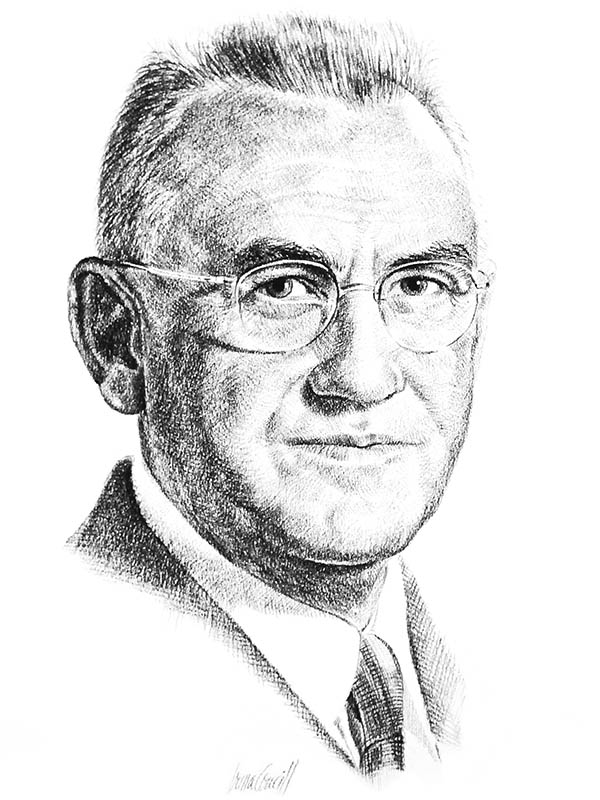Hockey Hall of Fame is open daily 10:00am – 5:00pm. Plan your visit today!

Under Selke, the Habs became the league's dominant team within a few years. The 1950s belonged to Montreal, which won in 1953 and then put together a record streak of five consecutive Cup wins (1956 to 1960).

Frank Selke Sr. began his life as a hockey executive while still in his teens. At just 14, he became manager of the Iroquois Bantams in Berlin (now Kitchener), Ontario, and later he met Conn Smythe during a tournament in which both men had teams competing. In 1919 Selke coached the University of Toronto Schools to a Memorial Cup championship in its first year of competition and shortly after began the Toronto Ravinas hockey team, a semipro outfit that soon provided players to the NHL. When Smythe purchased the Toronto St. Pats franchise and changed the team's name to Maple Leafs, he recruited Selke to be his assistant general manager. So began a 20-year relationship as strong as any in sports.
Selke wasn't only Smythe's right-hand man, he brought enormous energy, determination and success to the team. As coach of the Maple Leafs' junior club, the Toronto Marlboros, he won another Memorial Cup in 1929 and helped Smythe raise the necessary finances to build Maple Leaf Gardens and move the team from the dingy Arena Gardens (also known as Mutual Street Arena). He was also extremely valuable as an advisor to Smythe, someone whose sense of player evaluation was consistently astute and who could find talent where others might have dismissed a player's promise.
With this superb front office tandem the Leafs won the Stanley Cup in 1931-32, the team's first year in the impressive new building. Although they didn't win a second Cup for a decade, they were the elite of the league and appeared in seven finals series from 1932 to 1940. In the spring of 1942, the Leafs became the first and still only team to rally from 3-0 down in the finals to win the Cup. Early in the 1942-43 season, fresh on the heels of that historic win, Smythe left the team and country to fight for Canada in France. He left the handling of all the Maple Leafs' operations in Selke's hands, knowing he could trust his friend, associate and hockey equal.
The Smythe-Selke relationship, was scarred at this time however, when Selke traded an unknown player in the Toronto system - Frank Eddolls - to Montreal for Ted Kennedy, a 17-year-old prospect Selke had preferred over Smythe's liking for Eddolls. Smythe was furious that, even though he was overseas, he wasn't consulted about the deal, which Selke knew he'd have nixed had he'd the chance. Smythe never forgave him, and matters were made worse when Kennedy turned out to be one of the finest players ever to skate for the Leafs and Eddolls's career never took flight - thus, in essence, proving Selke right and Smythe wrong in this one instance. Further problems occurred because Selke opened up the Gardens to other entertainment and rental opportunities that weren't hockey related, which Smythe also objected to. These events, however, generated large sums of money, and when Smythe returned to Toronto in 1945, he was greeted by a team board of directors that wanted Selke to remain the boss, something Smythe obviously couldn't endure.
Smythe fought tooth and nail to regain control of the team and building, but his victory cost him a friend and partner. In the summer of 1946, Selke resigned from the Leafs and became general manager of the nemesis Montreal Canadiens. Under Selke, the Habs became the league's dominant team within a few years, but only, ironically, after the Leafs enjoyed their period of greatest success. Smythe's team won the Cup four times in five years (1947 to 1949 and 1951) but the 1950s belonged to Montreal, which won in 1953 and then put together a record streak of five consecutive Cup wins (1956 to 1960).
Selke was elected to the Hockey Hall of Fame in 1960 for his lifelong dedication and contribution to the game, which included his efforts to help build the Hall in Toronto. Four years later he retired, just as the Leafs were entering another golden age and the Habs were on the verge of one more of their own. The league later introduced a trophy bearing his name, awarded annually to the best defensive forward in the game.